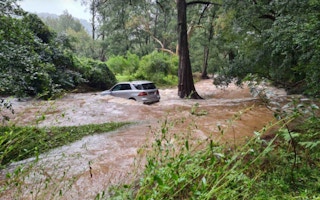A United Nations-backed alliance launched to push the insurance industry to slash underwritten greenhouse gas emissions to safe levels has been called into question by environmental campaign groups for lacking ambition.
To continue reading, subscribe to Eco‑Business.
There's something for everyone. We offer a range of subscription plans.
- Access our stories and receive our Insights Weekly newsletter with the free EB Member plan.
- Unlock unlimited access to our content and archive with EB Circle.
- Publish your content with EB Premium.
Launched at the World Economic Forum in Davos, Switzerland on Tuesday, the Net-Zero Insurance Alliance (NZIA) target-setting protocol aims to align the 29 NZIA members with a 1.5°C global warming limit as stipulated in the Paris climate accord with a framework for cutting climate-wrecking emissions.
The insurance trade can play an important role in the energy transition by divesting assets from fossil fuel projects. In some places, such as Florida, consumers are struggling to get insurance for extreme weather events that are forecast to become more damaging as the climate crisis intensifies.
The launch of the first version of NZIA’s protocol requires NZIA members to set and disclose initial decarbonisation targets by 31 July.
It was hailed a “landmark breakthrough” at the launch event in Davos by NZIA chair and group chief risk officer of insurance giant AXA Renaud Guidée, who said the protocol would lead to “unprecedented and ambitious” climate targets from insurers.
The protocol builds on the launch of a global accounting standard to measure emissions from insurance portfolios developed by the Partnership for Carbon Accounting Financials (PCAF) and the NZIA.
It emerges 18 months after NZIA’s launch at the 2021 G20 Climate Summit in Venice by eight of the world’s biggest insurers and reinsurers. NZIA has since grown to 29 members, accounting for 15 per cent of global insurance premium volume.
However, NZIA’s decarbonisation plan has drawn criticism from activists who say the protocol “opens the door to corporate greenwashing” because it does not mandate insurance firms reduce the Scope 3 emissions – emissions from the full value chain – of their customers.
Insure Our Future, a non-profit campaigning to stop the insurance of new and expanded fossil fuel projects, said the new protocol enables insurers to disclose the operational emissions of the coal, oil and gas firms they insure but ignore the much larger emissions from burning the fossil fuels that their cover enables.
It also enables insurers to aim for emissions cuts that are as low as 34 per cent by 2030, which is signicantly below the reduction targets of the Intergovernmental Panel on Climate Change’s 1.5°C report of 43 per cent and the 50 per cent reduction goals mandated by the Race to Zero campaign, a UN-backed initiative rallying non-state actors to halve global emissions by 2030.
The non-profit also noted that some insurers have offered the new protocol as an alternative to fossil fuel exclusion policies, which NGOs are agitating for. The protocol does not cover the lines of business which are typically used to insure new power plants, allowing insurers to make net-zero claims while they continue to insure fossil fuel projects.
Peter Bosshard, global coordinator of the Insure Our Future campaign, said the NZIA “offers a fig leaf for business as usual” and does not align the insurance trade with the climate-critical 1.5C global warming limit.
“Insurance companies should go beyond this low-ambition protocol and follow the science when they set their decarbonisation targets,” he said.
Global insured losses from natural catastrophes in first half of last year reached US$35 billion, 22 per cent above the average of past ten years. A 2022 study by Swiss Re, a re-insurer, found that economic losses from climate-related natural disasters are growing by 5 to 7 per cent a year as the effects of a warming planet intensify.
This story is part of Eco-Business’ coverage of the World Economic Forum Annual Meeting in Davos.










